The 10th International Conference on Transportation and Space Time Economy (TSTE 2022): The Low Carbon Transportation Forum was successfully held at Beijing Jiaotong University
On December 7, 2022, from 19:00 to 22:30, the 10th International Conference on Transportation and Space Time Economy (TSTE 2022), the Low Carbon Transportation Forum, was successfully held at Beijing Jiaotong University. This meeting was hosted by the School of Economics and Management at Beijing Jiaotong University and co organized by Elsevier Group. It was held in the form of Zoom online conference and Elsevier video account live streaming. Six top editors of transportation journals, domestic experts, and young scholars were invited to have in-depth exchanges on the theme of low-carbon transportation. The six experts invited to attend and deliver speeches were: Editor in Chief of Transportation Research Part A: Policy and Practice, Professor Elisabetta Cherchi of the Department of Transportation at the University of Newcastle, United Kingdom, Co Editor in Chief of Transportation Research Part D: Transport and Environment, Professor Ge Yingen, Dean of the School of Transportation Engineering at Chang'an University, and Co Editor in Chief of Transportation Research Part D: Transport and Environment Professor Jason Cao from the Department of Urban and Regional Planning at the University of Minnesota, co founding editor of Travel Behavior and Society, Professor Lu Peiying from the Department of Geography at the University of Hong Kong, co editor of Travel Behavior and Society, Professor Wang Donggen from the Department of Geography at Hong Kong Baptist University, and Associate editor of Transportation Research Part A: Policy and Practice Professor Constantinos Antoniou, Department of Transportation Systems Engineering, Technical University of Munich, Germany. Scholars and teachers from over 50 universities and research institutes, including Tsinghua University, Tongji University, University of Hong Kong, Chinese University of Hong Kong, and Beijing Jiao Tong University, participated in the conference. Six invited experts accurately identified the challenges of low-carbon transportation development, guided the development strategy of low-carbon transportation, and had exciting interactions with participants on various issues such as sustainable transportation system construction, green travel, energy structure, etc. The response was enthusiastic. The total number of attendees reached 2187, including 110 in the Zoom conference room, 2077 views on the Elsevier video account, and 467 likes.
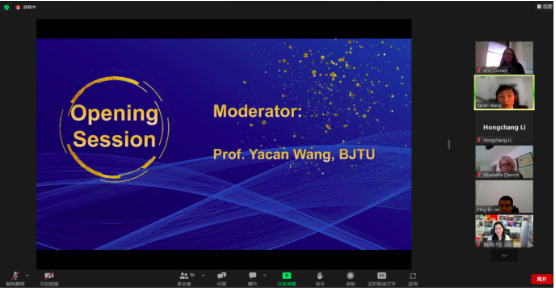
This meeting was chaired by Professor Wang Yacan from the School of Economics and Management at Beijing Jiaotong University, and the opening speech was delivered by Professor Shi Xianliang, the Dean of the School of Economics and Management. President Shi Xianliang expressed sincere gratitude to the participating guests in his speech, and then introduced the theme of this conference, "Low Carbon Transportation". He emphasized the importance of developing and implementing low-carbon strategies in the transportation system, and expressed his expectations for the insights and insights of the six editors in charge of low-carbon transportation research.
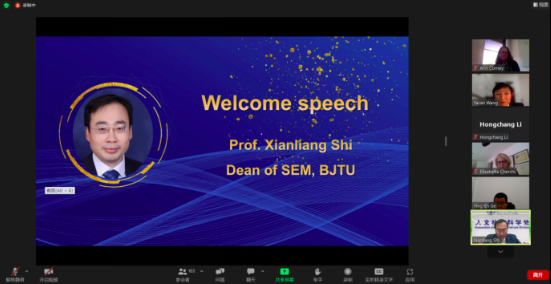
Opening Speech by Professor Shi Xianliang, Dean of the School of Economics and Management at Beijing Jiaotong University
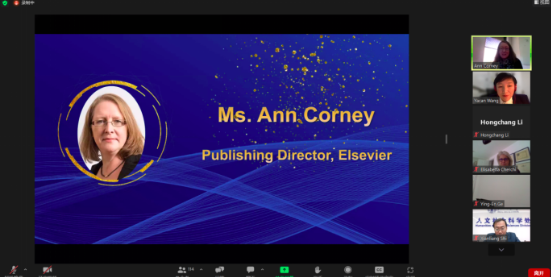
Ms. Ann Corney, Director of Elsevier Social Sciences Publishing, was subsequently invited to deliver a speech. Ms. Ann Corney thanked the organizer, the School of Economics and Management of Beijing Jiaotong University, for organizing this important conference. She stated that Elsevier Group has always maintained a good cooperative relationship with Beijing Jiaotong University, which is of great value for promoting research in various fields.
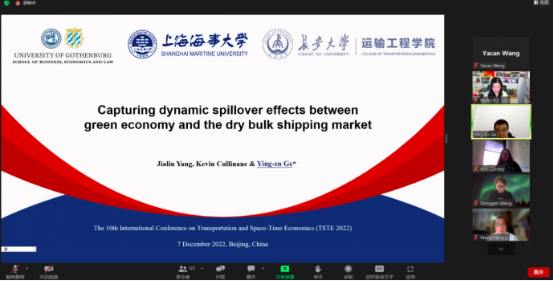
The meeting was divided into the first half and the second half, presided over by Professor Li Hongchang and Assistant Professor Shi Kunbo from the School of Economics and Management at Beijing Jiaotong University. In the first half, Professor Ge Ying'en, co editor of Transportation Research Part D: Transport and Environment and professor of Chang'an University, gave a speech on "Capturing the Dynamic Spillover Effect between the Green Economy and the Dry Bulk Shipping Market". Professor Ge Yingen's main research directions include traffic network modeling and analysis, traffic policy and environment, and international transportation and logistics. Professor Ge Yingen's speech focused on the emission issues of shipping and explained the dynamic connection between the dry bulk shipping market and the green economy in the United States, Europe, and Asia. He pointed out that empirical research results indicate that the green economy in the United States and Europe plays a leading role in the development of the dry bulk shipping market and the green economy in Asia. At the same time, the demand for green technology and energy in the dry bulk shipping market can stimulate the development of the green economy.
Subsequently, Professor Lu Peiying, co founding editor of Travel Behavior and Society and professor of the University of Hong Kong, delivered a speech on "Power Transport: Future Carbon Reduction Potential and Key Importance of Government Intervention". Professor Lu Peiying's main research directions include transportation, pedestrian mobility and urban morphology, road safety and spatial analysis, sustainability and transportation decarbonization, and smart cities. Professor Lu Peiying emphasized the necessity of reducing carbon emissions, improving energy efficiency, and ensuring inclusive, safe, and resilient sustainable transportation in the transportation system. She calculated the dynamic changes in indicators such as transportation carbon emissions intensity in the Greater Bay Area of China and the San Francisco Bay Area of the United States, and found that electricity transportation has led to a decrease in carbon emissions in these two regions. Professor Lu Peiying believes that government intervention is very important for carbon reduction, and more policy measures need to be formulated to reduce the carbon emissions of electric vehicles, such as strengthening supervision and promotion of clean energy, electric vehicle manufacturing and recycling.
Subsequently, Professor Wang Donggen, co editor in chief of Travel Behavior and Society, and Professor of Hong Kong Baptist University, delivered a speech on "Urban Development and Changes in Travel Behavior in Shenzhen and Hong Kong". Professor Wang Donggen's main research directions are activity travel behavior, time geography, social spatial isolation, and welfare geography. Professor Wang Donggen has always been concerned about the impact of the building environment on urban travel behavior and whether people are willing to spend a fixed time budget on daily travel. In this speech, he introduced his team's recent research on the long-term changes in travel behavior in Shenzhen and Hong Kong in recent decades. They found that throughout the entire study period, the travel distance in Shenzhen significantly increased, but the growth rate of travel time was slower and reached a stable level in the later stage. The impact of building environment on travel behavior will also change in direction and degree over time. On the other hand, he pointed out that it is also possible that potential factors beyond socio-economic factors have led to a stagnation in Hong Kong's household car ownership and tourism demand after entering the 21st century.
The second half of the meeting will begin with a speech by Professor Constantinos Antoniou, Deputy Editor of Transportation Research Part A: Policy and Practice, and Professor Constantinos Antoniou of the Technical University of Munich, on "Modeling the Impact of Emerging and Future Mobile Modes". Professor Constantinos Antoniou's main research directions are traffic system modeling and optimization, traffic system data analysis and machine learning, and human factors in future mobile systems. Professor Constantinos Antoniou pointed out that emerging and future mobility models are no longer centrally planned, but often the result of start-up activities that focus on operational aspects, neglecting prior planning and evaluation of their widespread impact. This has led to many problems in predicting the impact of emerging and future mobility models, including how these mobility models interact with other models How to generate demand. In view of this, Professor Constantinos Antonio introduced his different methods of modeling emerging mobile modes and presented practical cases of applying these modeling methods. He believes that as we move towards the future, we need to trust new technologies and apply new data collection techniques and advanced algorithms to help us answer and solve transportation problems.
Next, Professor Elisabetta Cherchi of Newcastle University, editor in chief of Transportation Research Part A: Policy and Practice, gave a speech on Analyzing and Forecasting the Travel Demand Caused by Innovation: Taking Electric and autonomous vehicle as an Example. Professor Elisabetta Cherchi is a former president of the International Association for Traffic Behavior Research (IATBR), with research interests in data collection, demand modeling, behavioral backgrounds for individual decision-making, and new methods for simulating the complexity of individual behavior. Professor Elisabetta Cherchi introduced methods for predicting innovation demand and estimating personal preferences, pointing out that consumer acceptance and speed of acceptance of new technologies are key research issues. She showed the impact of direct use experience, indirect use experience (such as providing information) and virtual use experience (such as experiencing driving through VR) on personal preferences in the context of electric vehicles and autonomous vehicle. Professor Elisabetta Cherchi believes that people's level of understanding and usage experience of new technologies have a strong impact on their preferences. She further pointed out that there are still many valuable issues worth exploring in the research topic of innovative travel demand.
Finally, Professor Jason Cao, co editor of Transportation Research Part D: Transport and Environment and professor at the University of Minnesota in the United States, delivered a speech on "Will banning motorcycles and electric bicycles disrupt sustainable transportation. Professor Cao Xinyu's main research directions include the interaction between land use and transportation, and the impact of information and communication technology on travel behavior. Professor Cao Xinyu used 2019 data from Zhongshan City to estimate the impact of building environment and motorcycle/electric vehicle ownership on car ownership, using gradient assisted decision trees to address the issue of how motorcycles and electric vehicles affect car ownership. The empirical results indicate that motorcycles and electric bicycles can weaken the promoting effect of income and distance from urban centers on car ownership. Professor Cao Xinyu pointed out that banning motorcycles and electric bicycles is not conducive to achieving sustainable transportation.
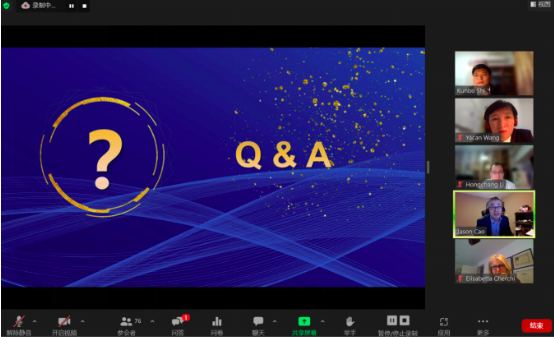
In the first and second half of the meeting, interactive Q&A sessions were set up. The audience and attendees actively expressed their opinions and questions about the speech content. The speaker and attendees had detailed discussions and exchanges on research topics, model building, data acquisition, and other issues.
At this point, the 10th International Conference on Transport and Space Time Economy (TSTE 2022) successfully concluded the low-carbon transportation forum. The successful holding of the Low Carbon Transportation Forum is a new exploration by the School of Economics and Management of Beijing Jiaotong University in innovating academic exchange and cooperation models for low-carbon transportation research across borders, boundaries, and fields. It also contributes to the construction and practice of the "Four Links" talent training model by Beijing Jiaotong University in the context of the transportation power strategy. From the perspective of academic exchange and knowledge dissemination, this low-carbon transportation forum has greatly broadened the academic horizons of teachers and students from major domestic universities, improved the international exchange level and academic influence of Beijing Jiaotong University, and promoted the interaction and absorption of low-carbon transportation research results worldwide. From the perspective of building a low-carbon transportation research localization and academic exchange internationalization platform, this low-carbon transportation forum provides an international platform for high-level academic research, exchange, and cooperation for domestic and foreign scholars and experts, especially young scholars in China. It effectively promotes high-level academic research, diversified communication channels, broad communication space, and internationalization of academic discipline influence.
In the future, the "Forum on Transportation and Space Time Economy" series of conferences will inherit and develop the successful experience mentioned above, practice the school motto of "knowing and doing", focus on China's development, gather global strength, truly effectively assist China in building a strong transportation country, promote the construction of a low-carbon transportation system in the world, actively promote high-quality development of domestic cities and economy, and effectively promote sustainable growth of transportation and economy worldwide.











